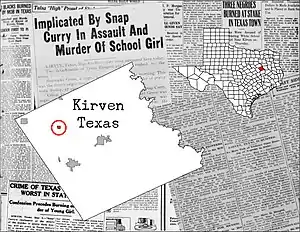| Part of Jim Crow Era | |
 Kirvin Lynching news coverage | |
| Date | May 6, 1922 |
|---|---|
| Location | Kirvin, Freestone County, Texas |
| Participants | A white mob of Kirvin, Texas lynched 3 Black men |
| Deaths |
|
Three Black men were Lynched in Kirvin, Texas for allegedly murdering a young girl. According to the United States Senate Committee on the Judiciary it was the 19th of 61 lynchings during 1922 in the United States.[1]
Background
On May 4, 1922, on the last day of school in Kirvin, Texas, 17-year-old Eula Ausley was on her way home from school when she was grabbed from her horse, sexually assaulted and then horribly mutilated.[2] Her absence was noticed and a search party was sent out. They came across the body and the search party turned into a posse of 1,000 men armed with whatever weapon they had. Eula Ausley's family was in a feud with another family and the local Sheriff Horace Mayo already had two white suspects of that family in custody when the wife of McKinley "Snap" Curry told the Sheriff that he had suspiciously come home with blood on his clothes. The Sheriff changed the course of the investigation and arrested Curry. Under interrogation, he implicated two other men, Johnny Cornish (19) and Mose Jones (46).[3] The three were arrested and held in jail.
Lynching
At midnight of May 6, the mob forced its way into the prison and dragged the three men out of the jail. The men were tortured on a lot between the old Baptist Church and the Methodist Church in Kirvin. Some reports state that they were castrated but at least two were burned alive. The victims were forced to watch as the others were tied to a plow, had wood stacked around them, doused with gasoline and lit on fire.
One paper reported that Tom Cornish was hanged from a tree.[4]
Aftermath
The two white men, Claude[5] and Audey Prowell,[6] who were initially arrested, were released and the sheriff released a statement that they were not involved in the murder of Eula Ausley.[3] Author Monte Akers in his book Flames After Midnight: Murder, Vengeance and the Desolation of a Texas Community, concluded that McKinley "Snap" Curry conspired with Claude and Audey Prowell to kill Eula Ausley and that Mose Jones and Johnny Cornish were innocent.[7]
Bibliography
Notes
References
- Akers, Monte (2011). Flames After Midnight: Murder, Vengeance and the Desolation of a Texas Community. University of Texas Press. ISBN 9780292726338. - Total pages: 274
- "3 Black Burned by mob in Texas". The Morning Tulsa Daily World. Tulsa, Oklahoma: World Pub. Co. May 7, 1922. pp. 1–74. ISSN 2163-4637. OCLC 12228935. Retrieved January 30, 2022.
- "Kirven, Texas is Quieted". The Topeka State Journal. Topeka, Shawnee, Kansas. May 8, 1922. pp. 1–10. ISSN 2377-7117. OCLC 9124974. Retrieved January 30, 2022.
- United States Senate Committee on the Judiciary (1926). "To Prevent and Punish the Crime of Lynching: Hearings Before the United States Senate Committee on the Judiciary, Subcommittee on S. 121, Sixty-Ninth Congress, First Session, on Feb. 16, 1926". United States Government Publishing Office. Retrieved January 23, 2022.